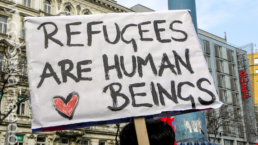Consider how differently Europe and the United States have been treating white, Christian Ukrainian refugees than those from anywhere else.
by Helen Benedict, Tom Dispatch
Almost anyone would agree that war is horrifying and peaceful countries should do their best to help its victims. The widespread eagerness to welcome fleeing Ukrainians after Russian President Vladimir Putin invaded their country last February is a heartening example of such aid. But behind that altruism lies an ugly truth: most of the countries embracing Ukrainians are simultaneously persecuting equally desperate refugees from elsewhere.
Such unequal mercy would be no surprise from nations like Ukraine’s neighbors Hungary and Poland, controlled by nationalist parties that have rarely welcomed anyone not white and Christian. However, the same thing is happening in Western Europe, the United Kingdom, Australia, and here in the United States, the very democracies sworn to protect those fleeing war and persecution and that, in the case of America, sometimes turned those people into refugees in the first place. Our Global War on Terror alone has displaced an estimated 37 million people since we invaded Afghanistan in 2001.

One of the worst examples of this unequal mercy is taking place in Greece, a major gateway to Western Europe for anyone fleeing the Middle East or Africa. Between February and mid-April of this year, some 21,000 Ukrainians made it to Greece — more in three months than the total number of asylum seekers who entered the country in all of 2021. There, the Ukrainians were instantly granted temporary protection status, giving them access to medical care and jobs, subsidized housing and food allowances, schooling for their children, and Greek language classes for adults.
This is an admirable example of how all people who flee danger and war should be welcomed. But I’ve been visiting Greece for years now to research my new book, Map of Hope and Sorrow: Stories of Refugees Trapped in Greece, and I know a lot of refugees there who have found no such generosity. Most are Syrian, Afghan, or Iraqi, but some are Kurdish or Palestinian, while others come from African countries, including Cameroon, Eritrea, Gambia, Nigeria, Sierra Leone, Somalia, and the Republic of Congo.
Recent Posts
“Arrest Now, Ask Questions Later”: Why Did L.A. ICE Agents Arrest and Jail U.S. Citizen Andrea Velez?
July 3, 2025
Take Action Now “They didn’t have vests that said ICE or anything. Their cars didn’t have license plates. … Just because of the color of our…
Trump’s Big, Beautiful Bill Is Naked Class War
July 3, 2025
Take Action Now Trump’s “Big, Beautiful Bill” trades tax cuts on millionaires for the dissolution of society.By Hamilton Nolan, In These Times…
Mayor Mamdani’s First Day, A Zero Hour Conversation With Richard Wolff
July 2, 2025
Take Action Now If elected, what would Mayor Mamdani do on his first day in City Hall? How would a democratic socialist govern as a big-city mayor?……
The U.S. Is Funding A Bloodbath At Gaza Aid Centers
July 2, 2025
Take Action Now The admin just gave $30M to GHF, the organization at the center of charges that Israel is weaponizing assistance and shooting at…




